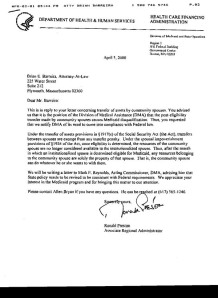When one spouse enters a nursing home and may be applying for MassHealth, the spouse who remains at home or in assisted living often has some important choices to make with an unbiased legal advisor.
One of the biggest mistakes that many spouses make when the other spouse enters a nursing home is not getting legal advice from an elder law attorney about Medicaid, known in Massachusetts as “MassHealth.” The “free” information that many community spouses (which under MassHealth law means any spouse who is not in a nursing home) often rely on can turn out to be quite costly to them.
There are different layers in MassHealth law, and many persons only seem to know about the bottom layer, so let’s go over that one first. Under 2022 law, just about everything other than the home and car are totaled, and the community spouse supposedly can keep only the first $137,400.00.
Unfortunately, this lower layer is where the knowledge of many persons ends, and two other upper layers of the law effectively override the lower layer. One upper layer is that the community spouse can enter into certain types of annuity agreements with the spenddown (that is, excess) assets.
Before even thinking about using the annuity layer, however, the community spouse should keep three things in mind: (A) not every annuity will work; (B) the published regulations and unpublished internal procedures and policies which now allow such a move can change with little advance notice, so it is often not advisable that an annuity be purchased until the institutionalized spouse’s nursing home stay has already occurred; and most importantly (C) some community spouses can keep everything without needing an annuity, and are better off without an annuity, due to the other upper layer of MassHealth law that protects income for the community spouse.
At present, the community spouse has the absolute right to an income of at least 2,177.50 per month. This is known as the Minimum Monthly Maintenance Needs Allowance (“MMMNA”). If shelter expenses exceed 30% of this figure, or $653.25, or if a disabled child lives at home, the community spouse is often entitled to keep a higher MMMNA. If the Social Security and pension payable in the name of the community spouse is less than the $2,177.50 figure, at the end of the MassHealth application process the community spouse is allowed to keep some or all of the institutionalized spouse’s income to be brought up to the MMMNA.
If the needs of the community spouse are greater than $3,435.00 per month, a higher amount of income can sometimes be preserved for the community spouse via the fair hearing appeal process, where the need to keep the other assets has to be proved to maintain the financial ability to remain in the community. A common situation where need can be fairly easily proved is where the community spouse is living in an assisted living facility and needs to be there due to frailty, medical condition or other special needs. Once the need to be in assisted living is established, the appeal is primarily about numbers and prevailing interest rates, so the elder law attorney can often handle it alone without the community spouse having to go to the hearing.
Another option to retain greater income for the community spouse is a Probate Court procedure known as separate support. Since both spouses need legal representation in court, it is important that the institutionalized spouse have a durable power of attorney that allows the appointed agent or attorney-in-fact to hire a lawyer.
When spenddown and appeal options are determined by an elder law attorney as potentially unsuccessful, the community spouse can often purchase certain types of immediate annuities, where the assets used to make the purchase then change character and are treated as the community spouse’s protected income.
One other option available to the community spouse, but not often done in Massachusetts, is known as spousal refusal, where the community spouse refuses to cooperate in the application and payment processes.

